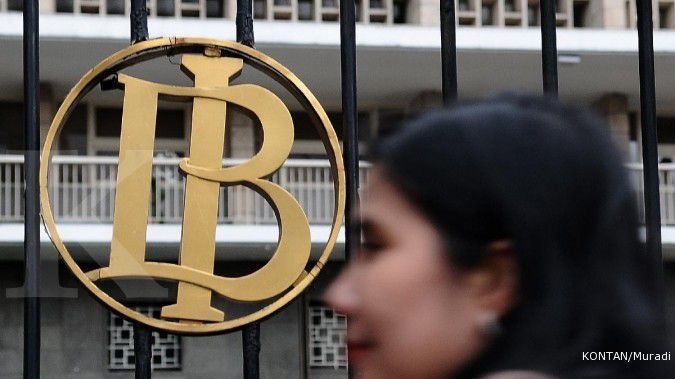JAKARTA. Bank Indonesia (BI) has kept its benchmark interest rate unchanged ahead of expected subsidized fuel price increases this month and says a reduction in fuel subsidies will boost economic growth, as the government sets an ambitious 5.8 percent economic growth target for next year. The central bank held the BI rate unchanged at 7.5 percent as its six-member board of governors considered the rate appropriate to counter any inflationary shocks from fuel price increases. Upping the prices of fuel may hurt people’s purchasing power and the country’s economic growth, given that domestic consumption now accounts for more than half of Southeast Asia’s largest economy. That could challenge President Joko “Jokowi” Widodo’s vision of 7 percent economic growth that is to be supported by infrastructure projects and subsidy reallocation programs during his five-year term. BI deputy governor Perry Warjiyo said the fuel price increases may spur economic growth higher. “By cutting fuel subsidies, the government will have sufficient funds to finance various economic projects, which in turn will boost economic growth,” he explained. According to the 2015 state budget, economic growth is projected to climb to 5.8 percent, up from a target of 5.5 percent this year. Those numbers are being compared to the reality that the economy grew only 5 percent year-on-year in the third quarter this year, the slowest since 2009. The central bank has forecast that the economy will surge between 5.4 and 5.8 percent next year. “The amount of funds saved can reach Rp 106 trillion [US$8.69 billion] if prices are increased by Rp 2,000 per liter. The higher the fund allocation, the higher the growth. It may even reach the upper level of our range,” Perry said. BI is also upbeat that economic conditions will improve next year, backed by an improving global economy, rising investment in Indonesia and higher government spending. The central bank shouldered part of the blame for the country’s economic slowdown as its tight monetary stance – with a 175 basis points interest rate increase last year – was seen as hindering growth in domestic consumption and investment, according to several analysts. But BI Governor Agus Martowardojo said the domestic economic slowdown was mostly caused by the global economic slowdown that weakened overseas demand as well as commodity prices. “Emerging economies are undergoing a slowdown, including China, and that has reduced demand for our main commodities, such as rubber, coal and palm,” he said. Agus also said that the current BI rate was appropriate to counter any subsidized fuel price increases that could lead to a spike in inflationary pressure. BI has set this year’s inflation rate target between 3.5 and 5.5 percent. The consumer price index is estimated to hover at 3 to 5 percent next year. Gareth Leather, Asia economist of the London-based research firm Capital Economics, said inflation could surge to as high as 8 percent in the coming months if the new administration pushed ahead with plans to cut fuel subsidies. But the BI rate would most likely remain on hold at least for the remainder of this year and into early 2015, according to Leather. “Any rise in inflation should prove temporary and we would not necessarily expect BI to hike interest rates in response,” he said. Meanwhile, UOB economic-treasury research analyst Ho Woei Chen was among analysts who thought that a further interest rate increase may be required if fuel prices were substantially increased. (Tassia Sipahutar)
Fuel-price hike no threat to growth target: BI
JAKARTA. Bank Indonesia (BI) has kept its benchmark interest rate unchanged ahead of expected subsidized fuel price increases this month and says a reduction in fuel subsidies will boost economic growth, as the government sets an ambitious 5.8 percent economic growth target for next year. The central bank held the BI rate unchanged at 7.5 percent as its six-member board of governors considered the rate appropriate to counter any inflationary shocks from fuel price increases. Upping the prices of fuel may hurt people’s purchasing power and the country’s economic growth, given that domestic consumption now accounts for more than half of Southeast Asia’s largest economy. That could challenge President Joko “Jokowi” Widodo’s vision of 7 percent economic growth that is to be supported by infrastructure projects and subsidy reallocation programs during his five-year term. BI deputy governor Perry Warjiyo said the fuel price increases may spur economic growth higher. “By cutting fuel subsidies, the government will have sufficient funds to finance various economic projects, which in turn will boost economic growth,” he explained. According to the 2015 state budget, economic growth is projected to climb to 5.8 percent, up from a target of 5.5 percent this year. Those numbers are being compared to the reality that the economy grew only 5 percent year-on-year in the third quarter this year, the slowest since 2009. The central bank has forecast that the economy will surge between 5.4 and 5.8 percent next year. “The amount of funds saved can reach Rp 106 trillion [US$8.69 billion] if prices are increased by Rp 2,000 per liter. The higher the fund allocation, the higher the growth. It may even reach the upper level of our range,” Perry said. BI is also upbeat that economic conditions will improve next year, backed by an improving global economy, rising investment in Indonesia and higher government spending. The central bank shouldered part of the blame for the country’s economic slowdown as its tight monetary stance – with a 175 basis points interest rate increase last year – was seen as hindering growth in domestic consumption and investment, according to several analysts. But BI Governor Agus Martowardojo said the domestic economic slowdown was mostly caused by the global economic slowdown that weakened overseas demand as well as commodity prices. “Emerging economies are undergoing a slowdown, including China, and that has reduced demand for our main commodities, such as rubber, coal and palm,” he said. Agus also said that the current BI rate was appropriate to counter any subsidized fuel price increases that could lead to a spike in inflationary pressure. BI has set this year’s inflation rate target between 3.5 and 5.5 percent. The consumer price index is estimated to hover at 3 to 5 percent next year. Gareth Leather, Asia economist of the London-based research firm Capital Economics, said inflation could surge to as high as 8 percent in the coming months if the new administration pushed ahead with plans to cut fuel subsidies. But the BI rate would most likely remain on hold at least for the remainder of this year and into early 2015, according to Leather. “Any rise in inflation should prove temporary and we would not necessarily expect BI to hike interest rates in response,” he said. Meanwhile, UOB economic-treasury research analyst Ho Woei Chen was among analysts who thought that a further interest rate increase may be required if fuel prices were substantially increased. (Tassia Sipahutar)



